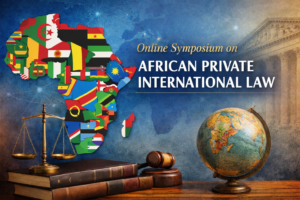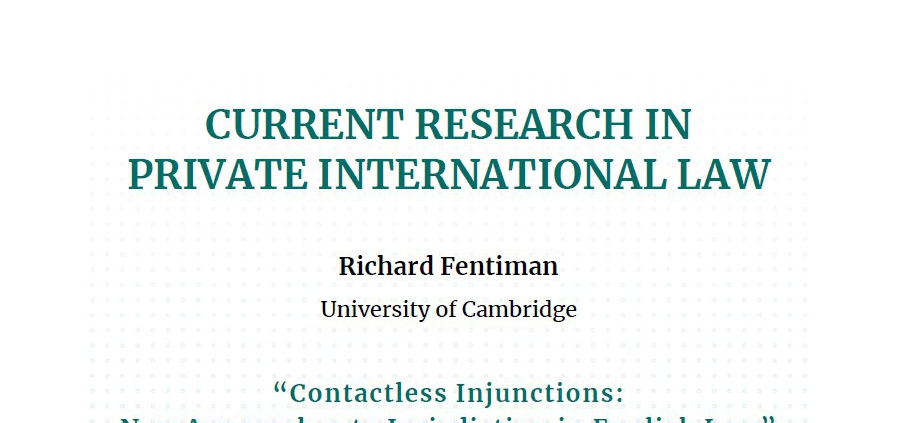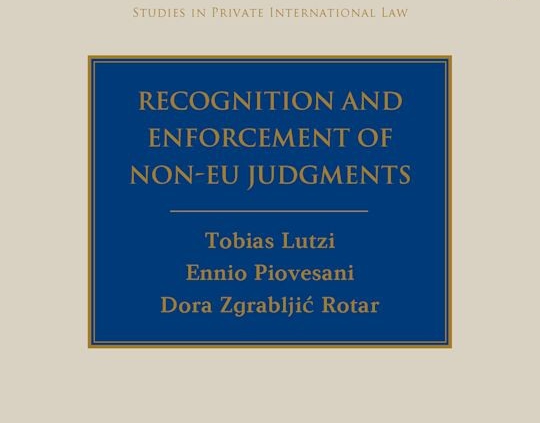Views
REFLECTIONS ON RECENT DEVELOPMENTS IN AFRICAN PRIVATE INTERNATIONAL LAW
I. INTRODUCTION
This is the second symposium relating to private international law in Africa to be hosted on this blog, following a series that has run consistently since 2 February 2026. The first symposium, which focused on private international law in Nigeria, took place on 14 December 2020 and was jointly hosted on Afronomics and this blog. It was organised by Professor Richard Frimpong Oppong and me.
Professor Beligh Elbalti and I are deeply grateful to the scholars who agreed to participate in this symposium at short notice, including Dr Solomon Okorley, Dr Theophilus Edwin Coleman, Dr Elisa Rinaldi, Miss Anam Abdul-Majid, Mr Kitonga Mulandi, Dr Boris Awa, and Dr Abubakri Yekini.
The idea for this second symposium originated with my dear colleague, Professor Beligh Elbalti, and I am thankful to him for involving me in the leadership and organisation of this project. The symposium finds its true genesis in a larger edited volume we are currently preparing on the recognition and enforcement of foreign judgments in Africa, which examines developments across no fewer than twenty-six African jurisdictions. Read more
Protection of Forced Heirs and International Public Policy
Written by Matteo Mangone, PhD candidate in Private Law at the University of Turin
Protection of Forced Heirs and International Public Policy: A Comparative Analysis of Germany and Italy in Light of the Bundesgerichtshof Judgment of 29 June 2022
1. The German Approach
The Bundesgerichtshof (Federal Court of Justice), in its judgment of 29 June 2022, affirmed the following legal principle: the protection of mandatory heirs pertains to German public policy and, consequently, pursuant to Article 35 of EU Regulation No. 650/2012, it is possible to disregard the lex successionis designated under Article 22 of the same Regulation whenever its application does not concretely guarantee mandatory heirs a level of protection at least equivalent to that ensured by German inheritance law. Read more
Online Symposium on Recent Developments in African PIL (VII) – South Africa’s Supreme Court of Appeal orders the return of a child under the Hague Child Abduction Convention

As part of the second online symposium on recent developments in African private international law, we are pleased to present the seventh an final contribution, kindly prepared by Solomon Okorley (University of Johannesburg, South Africa), which examines a decision of the South African Supreme Court of Appeal ordering the return of a child under the Hague Child Abduction Convention.
South Africa’s Supreme Court of Appeal Orders the Return of a Child under the Hague Child Abduction Convention: Marital Status of Parents not Important in Determining the Child’s Habitual Residence
News
Richard Fentiman’s Lecture on Contactless Injunctions in English Law
Richard Fentiman will be speaking on “Contactless Injunctions: New Approaches to Jurisdiction in English Law” at the forthcomming virtual workshop in the Max Planck Institute for Comparative and International Private Law series “Current Research in Private International Law” to be held on on Tuesday, 3 March 2026, at 11:00 (CET).
Richard Fentiman is Professor Emeritus of Private International Law at the University of Cambridge. His research is especially concerned with the law and practice of international commercial litigation and in particular with issues concerning jurisdiction and interim remedies. He will be speaking about the practice of the English courts which regularly grant extraterritorial injunctions to freeze foreign assets or prevent foreign proceedings. In a departure from past practice they will now do so even in the absence of any material link with England. This reveals much about English law’s distinctive approach to injunctions and begs deeper questions about the appropriate grounds for exercising jurisdiction in private international law.
The virtual lecture will be held as a video conference via Zoom. Prior registions is necesarry by Monday, 2 March 2026, using this link.
Jurisdiction in the Middle Ages

Since not all readers of the blog can be presumed to be avid consumers of the Journal of Legal History, it may be worth pointing out that issue 46/1 (2025) (table of contents here) was dedicated to jurisdiction in the European Central Middle Ages. In their (open access) introduction, historians Danica Summerlin and Alice Taylor suggest explaining medieval law neither through the (rediscovered) Codex Justinianus as the basis of a ius commune, nor through the concept of legal pluralism, but instead through the emerging law of jurisdiction. Indeed, their approach deviates from earlier state-focused analyses on struggles between state and church and instead “foregrounds actors and performances as the means by which jurisdictions were asserted, defined and formalized – or, to put it another way, as the means by which jurisdiction came into being.” The issue emerges from a British Academy funded multi-year research project on Jurisdictions, political discourse, and legal community, 1050–1250 that brought together (legal) historians from Europe and North America – but not, it seems, conflict of laws scholars. The contributions are fascinating and relevant for those of us who want to understand conflict of laws through its history – and may perhaps even provide a basis for future collaborations across disciplines?
New Book Alert: Recognition and Enforcement of Non-EU Judgments
An upcoming milestone in private international law — Recognition and Enforcement of Non-EU Judgments (Bloomsbury / Hart Publishing, Feb. 19 2026), edited by Tobias Lutzi, Ennio Piovesani, and Dora Zgrabljic Rotar.
This is not just another doctrinal text, but the first comprehensive comparative deep dive into how EU Member States handle judgments from outside the EU, an area of law that has been notoriously fragmented and under-theorized.
The book contains country reports from 21 EU Member States on their national rules on recognition and enforcement of non-EU judgments in a unified framework, giving the reader both breadth and comparative depth. The editors pull these strands together in a detailed comparative report that highlights patterns of convergence and divergence across EU jurisdictions. Additionally, the book situates the Member State approaches in relation to the Brussels I regime and the 2019 HCCH Judgments Convention, which is itself reshaping global judicial cooperation. It had practical and scholarly appeal
The release date is 19 February 2026 and it is available for pre-order already at here.





